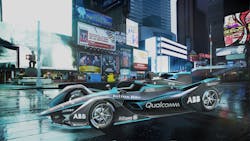NASCAR, IndyCar, Formula One, no matter what type of car race you attend one thing you can’t escape is the noise. Believe me, I know first hand as I go to the Indianapolis 500 every year and just this week, the NACFE Board of Directors was hosted by Ed Carpenter Racing at its offices and shop in Indianapolis. Amazing to see these machines up close and personal and to meet the engineers and drivers getting them up to 240 mph!
While it is cool to see what the various teams have done to tweak their cars, so they are the fastest and to see the strategies around the optimal time to pull into the pits, these events tend to be loud. VERY LOUD!
However, there is one racing event where noise is not such a big issue. And that is ABB FIA Formula E racing. I was at the first race in the U.S. in Miami a few years ago and I was surprised at how quiet it was and the lack of the smell of exhaust. I remember distinctly, for the first time in my 45 years of being a spectator at a live race car event, I was able to talk to someone sitting next to me. I looked around and others were also enjoying their time at the track by being able to share their experiences with others. How cool!
ABB FIA Formula E, kicking off its fourth season in December, is a fully-electric street racing series.
This season will see the debut of the second generation of electric powered race cars. According to Stephen Lane, engineer for Envision Virgin Racing, there have been significant advancements in battery technology for this season. According to Lane, the car will now go longer and faster. In a recent interview he said, “In terms of battery capacity, it’s almost doubled in capacity for a relatively minor increase in weight.”
Range is one of the concerns we hear about from fleets when it comes to them investing in commercial battery electric vehicles so I was heartened to see that in a relatively short period of time battery capacity has increased in the auto racing segment.
I know what you are thinking: “Mike, race cars and trucks have very little in common.” While that may be true, when it comes to new technology advancements in one application can often be translated into advancements in another. Or at the very least they can give engineers working on a technology for an adjacent market some new ideas that can help make the technology work better in the application they are focused on.
What I am saying is any win for electric power in a vehicle application is a good thing for electric power as it applies to trucks.
I will keep watching developments in e-racing to see if there are any parallels for those of us interested in seeing wider adoption of electric power in the trucking industry.
And who knows maybe sometime in the not too distant future when I am at the Indy 500 I will actually be able to carry on a conversation with one of my friends during the race. It could happen.
About the Author

Michael Roeth
Executive Director
Michael Roeth is the executive director of the North American Council for Freight Efficiency. He serves on the second National Academy of Sciences Committee on Technologies and Approaches for Reducing the Fuel Consumption of Medium and Heavy-Duty Vehicles and has held various positions with Navistar and Behr/Cummins.
